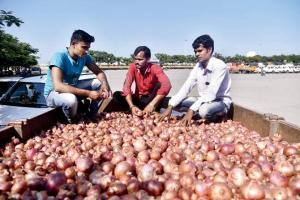Nashik's onion farmers ask why the government is mollycoddling well-to-do urban voters at the cost of their livelihoods

Farmers Shyam Shinde, Pundalik Bhoye and Ashok Jagtap in Pimpalgaon, Nashik. Pics/Pradeep Dhivar
The ruling Bharatiya Janata Party-Shiv Sena combine may be confident of coasting to an easy win in the Maharashtra assembly elections on the back of the abrogation of Article 370 in faraway Jammu and Kashmir. But there are still pockets where they will have to address real on-ground issues. Nashik, which has some of the country's biggest onion markets, is one of them and the farmers of the region are an angry lot these days.
ADVERTISEMENT
Just a few weeks ago, they were looking at making some profit by selling their produce at a five-year high price of Rs 4,000 per quintal. But with an eye on the urban voters, the Centre on September 29 banned export and imposed crippling stock limits for retailers (100 quintal) and wholesalers (500 quintal). As a direct result, prices have been steadily dropping, and stood at around Rs 2,800 on Tuesday.

Farmer Bhagirathi Gangurde says all politicians are rascals and she will not vote for anyone
When mid-day visited the Malegaon and Pimpalgaon markets on Tuesday, anger was on the rise. "We welcome the abrogation of Article 370," said Bharat Shewale, who was at the Malegaon Agriculture Produce Market Committee (APMC) for the day's auction. "We expect the BJP to show a similar commitment towards making our lives better by ensuring good pricing for our produce, as promised in their manifesto. We don't need farm loans. We need a policy that helps us recover our investment and gets us a decent profit so that we can support our families."
Bharat's cousin Arvind Shewale, who also grows onions, said that irrespective of which alliance is in power, the discriminatory policies remain the same. "Be it the Congress-NCP or the Sena-BJP, the policies are the same," he said. "They don't want the urban consumers to pay higher prices for onion as they fear losing their votes. But politicians don't even consider how unpardonable discrimination affects us financially. No party speaks for us." Another young farmer, who did not want to be named, blamed the media also.

Govind Gangurde's entire crop of winter onions was destroyed in the rain in Sogaras village in Chandvad tehsil.
"Why are you here?" he asked the mid-day team. "You don't visit us when prices drop to R1-2 per kg and we are forced to throw our produce on the roads. But when prices go up, you media people start shouting. It is because of you that the governments take such anti-farmer decisions."
Probably fairly, most other farmers also wonder about why the urban voters should be so protected. Ashok Jagtap of Bhakurde had brought 30 quintals of onion produce to the Pimpalgaon APMC. As he waited for the afternoon auction, he wondered why urban consumers who spend R500 for a kilogram of meat baulk at the thought of spending R50-R80 for a kilo of onions. "City people have the money to spend on things that they really don't need, but when it comes to buying farm produce, they behave as though the sky has fallen on them," he said.
Will not vote
Govind Gangurde, a farmer from Sogaras village in Chandvad tehsil who invests at least R40,000 per acre on sowing the winter onion crop, showed us the destruction caused by the rain. "We stay on the farms. Our wives, children and mothers work in the field to save on labour cost. What do we get in return?" Govind's aged aunt Bhagirathi Gangurde was harvesting bajra with other family members. "Sagale rajkarani badmaash aahet (all politicians are rascals). I will not go to vote," she said. The Gangurdes rely heavily on the winter crop for their livelihood.
A Pimpalgaon market official said while the government's intervention has stabilised the consumer price, stocks were depleting fast. "There will be shortage for next two months because the new onion crop is delayed." The issue is very important to Nashik district, which accounts for 40 per cent of the state's red onion produce. There are 14 APMCs in the district that trade in onion, tomato and other cash crops. Onion farming drives rural economy here. Pimpalgaon APMC vice-chairman Nivrutti Dhanvate said farmers are upset with the Centre's export ban and stock. "The policy made prices crash in two days, causing huge loss to the farmers," he said.
Hidden costs
The Shewale cousins also raised the discrepancy in the price at which the farmer sells the onions and the price the end user pays. "When we get R30/kg, why is the consumer, in Mumbai, paying Rs 70-80/kg? Where do the other Rs 40-50 go? It goes to the traders and others who don't sweat it out in the farms," he said. Dhanvate, however, defended the traders, saying they also had to invest in purchasing, packing and transporting the produce to various destinations. The cost overruns are high and impacts the end pricing," he said.
Catch up on all the latest Crime, National, International and Hatke news here. Also download the new mid-day Android and iOS apps to get latest updates
 Subscribe today by clicking the link and stay updated with the latest news!" Click here!
Subscribe today by clicking the link and stay updated with the latest news!" Click here!






